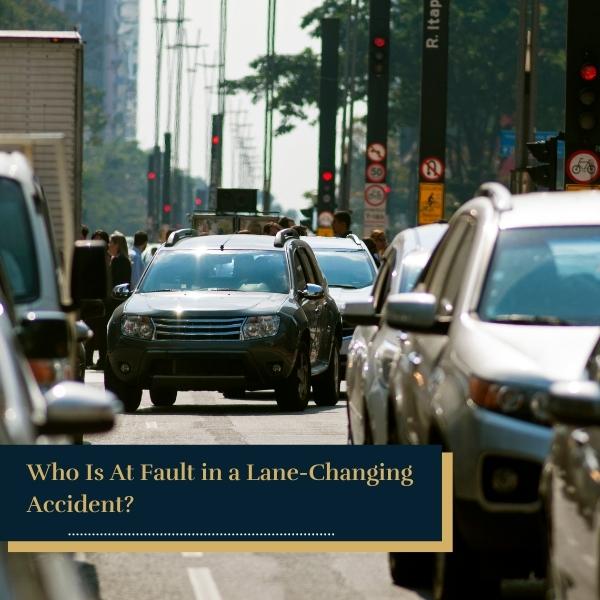Many drivers change lanes without thinking twice. But the consequences can be devastating when they do it without care or caution. If you were hurt in a lane-changing accident, you could be wondering who is at fault and whether someone else could be liable for your injuries. While the driver changing lanes is typically at fault, it depends on the circumstances of the crash.
At Robinette Legal Group, PLLC, we want to help you determine fault for an accident caused by an unsafe lane change. If you need help pursuing compensation after an accident someone else caused, contact us for a free case review with one of our West Virginia car accident attorneys.
What Is an Unsafe Lane Change?
Changing lanes requires extreme caution to avoid a collision. An unsafe lane change may occur when a driver:
- Doesn’t use their signal before changing lanes
- Doesn’t check their mirrors and blind spots before changing lanes
- Cuts off another driver when lane-changing
- Speeds up to block another vehicle from changing lanes
- Is too distracted to notice another car signaling a lane change
- Changes lanes or passes in an area where it is not allowed
- Speeds excessively to change lanes or pass another vehicle
How to Determine Fault in a West Virginia Lane-Changing Accident
The vehicle already in a lane typically has the right of way. When a driver changes lanes, they must yield to any vehicles already there. That means the driver is responsible for properly signaling their intent and checking their mirrors and blind spots to make sure the lane is clear of other vehicles. If they don’t, they could be at fault for a resulting collision.
There may be cases where the driver changing lanes is not at fault for an accident. For example, if the driver in the other lane is distracted or speeding, they could be found at fault for the accident rather than the lane-changing driver.
To determine fault in a lane-changing accident, insurance adjusters and investigators will consider the following questions:
- Did the lane-changing driver use their signal?
- Did the lane-changing driver check their mirrors and blind spots?
- Was either driver speeding?
- Was either driver using a cell phone, programming a GPS, or otherwise distracted?
- What were the weather and road conditions at the time of the accident?
- Did either vehicle experience a malfunction, such as a brake failure or a broken turn signal?
How to Determine Fault When Merging into Lanes of Traffic
In most situations, a merging driver must yield the right of way to anyone already in that lane. When a driver needs to merge into another lane, such as when entering a highway, they are responsible for signaling their intent to merge and checking to make sure the coast is clear. Merging vehicles must wait for an opening in the flow of traffic.
If a driver doesn’t signal their intent to merge or check and wait for an opening in the flow of traffic, they could be liable for a subsequent collision. To determine fault after a merging accident, an investigator will consider the actions of both drivers involved in the accident, the environmental conditions, and other relevant factors.
Who Is At Fault When Two Cars Change into the Same Lane?
When two cars move into the same lane simultaneously, they may share partial fault for the accident — depending on each driver’s actions. For example, if one driver used their turn signal but the other didn’t, the driver who failed to signal the lane change could be liable for the accident. However, West Virginia does not have a particular state law assigning right-of-way priority by lane.
Is West Virginia a No-Fault State?
West Virginia does not follow a no-fault rule when determining liability. Instead, the state uses a fault-based system for compensation after car accidents. In at-fault states such as West Virginia, you can pursue a claim with the at-fault driver’s car insurer or file a personal injury lawsuit against the at-fault driver.
However, the insurance company will likely try to deny your claim or pay you as little as possible. A skilled car accident lawyer can help you calculate your losses and demand the compensation you’re owed.
Can I File a Lawsuit to Seek Damage Compensation?
You can file a lawsuit to seek damages after a West Virginia lane-changing accident. However, most claims are settled before they ever make it to court. If you pursue a car accident claim, you could seek compensation for the following:
- Medical bills related to your injuries
- Costs of future medical care for your injuries
- Lost wages if you cannot work while healing
- Loss of future earning capacity if your injuries are permanent
- Pain and suffering
- Mental anguish
- Property damage, such as costs of car repairs
What Is the Statute of Limitations in West Virginia for Car Accidents?
Under West Virginia law, you have two years from the date of a car accident to file a personal injury lawsuit. While two years might seem like a long time, a lot of work is involved in preparing a lawsuit. Your attorney needs time to:
- Investigate the accident
- Gather evidence
- Locate eyewitnesses
- Complete tedious legal paperwork
- Negotiate with the insurance companies
- Take your case to court if needed
The sooner you contact a lawyer, the more time they have to build a strong case on your behalf.
Contact the West Virginia Car Accident Attorneys at Robinette Legal Group, PLLC for a Free Consultation
If you were injured in a lane-changing accident in West Virginia, contact the legal team at Robinette Legal Group, PLLC for help pursuing compensation. Our legal team can investigate the accident to determine who is liable and seek to hold them accountable for your injuries and other losses. Contact our office today for a free case review with one of our experienced car accident lawyers.
Jeffery Robinette was admitted to practice law in 1991 and is licensed in all levels of state and federal trial courts in West Virginia. Mr. Robinette is also licensed in all state and federal appeals courts in West Virginia and the United States Supreme Court. As a National Board Certified Trial Attorney who has handled hundreds of motor vehicle, injury, and construction defect claims and a leading author on insurance claims settlement issues and difficulties in West Virginia, Jeff Robinette is uniquely qualified to represent your best interest.





